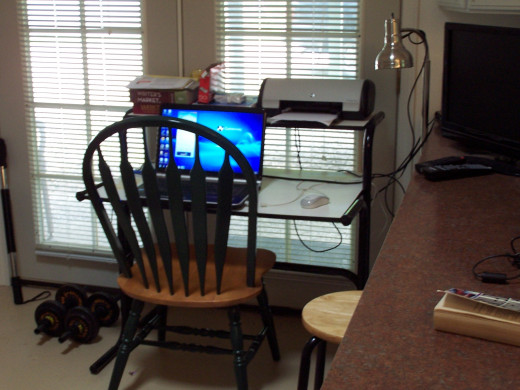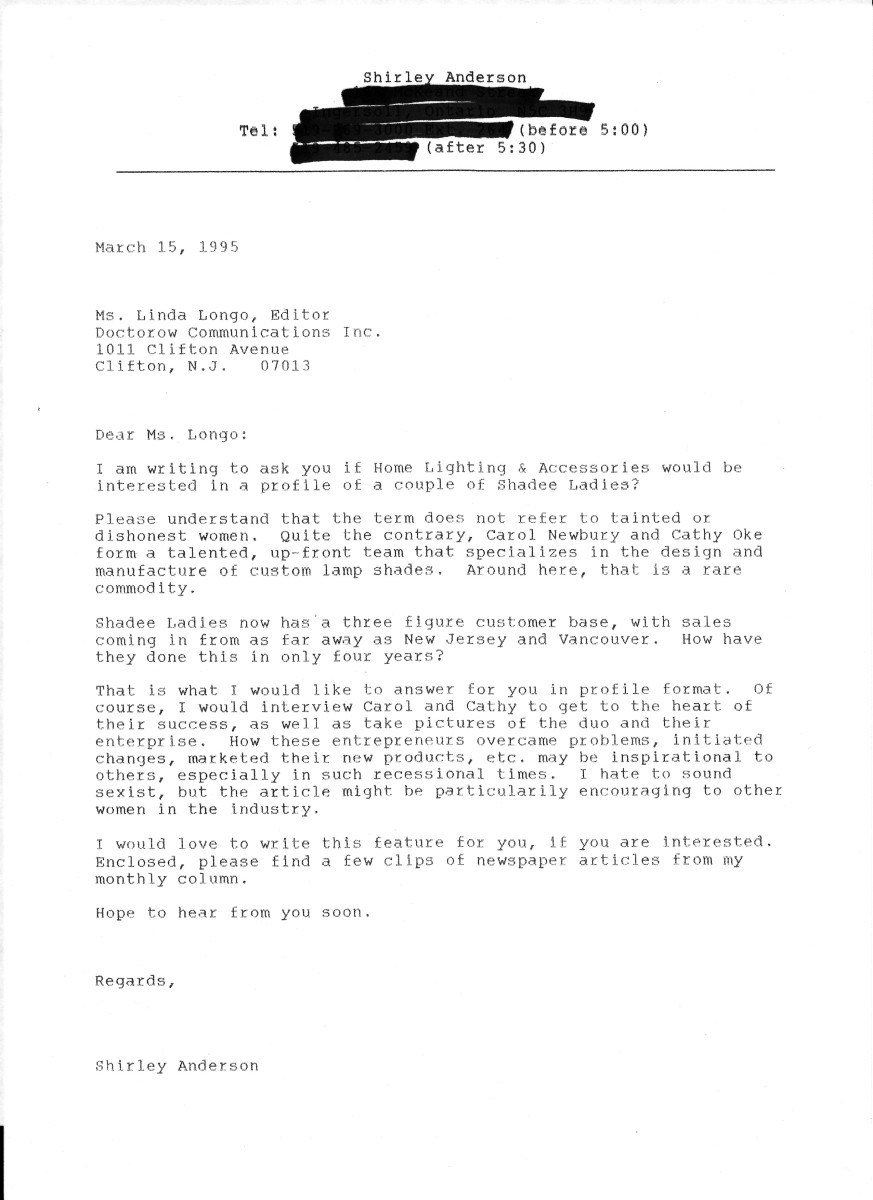Creative Writing Helpful Tips
Do Not Read If You Want Instant Gratification
If you do not breathe through writing, if you do not cry out in writing, or sing in writing, then don't write, because our culture has no use for it.
Anais Nin
I’m not into it, so stop here if you want the easy way to success in writing. I am a firm believer in the fact that we must pay our dues in order to become good writers, and we must pay even more dues to become excellent writers.
Writing is an art form. It is a craft. It is not something you gain by sending two boxtops in with a self-addressed stamped envelope.
I love the internet but I swear it has spawned a new generation of people who want results now. We want faster internet service so we can have our answers and entertainment NOW! We do not want to wait and we sure as hell do not want to work hard for results. Unfortunately, working hard is the only way to get results in writing.
If your goal is to become a good writer, and then a very good writer, and then an excellent writer, then these ten tips should help you attain that goal.

Join a writing forum for critique
BE A GOOD READER
The greats of the past are great for a reason: they worked at it. They continued to hone their skills by doing it over and over again. When they had perfected their craft they were then recognized, and even then it took years for the recognition.
We can learn a great deal by reading the greats of the past. Sit down and read “The Grapes of Wrath” and then try to write a scene description like Steinbeck. The first time I read that masterpiece I actually felt the pain and defeat that the main characters felt. I could taste the dirt in my food and my body ached from the heartache of losing it all.
Read the greats! Get a list of the fifty greatest books of all-time and then start reading them.
LEARN TO TAKE CRITICISM
The simplest thing in the world for a writer to do is write something and then give it to a family member for review. If that family member loves you then they will have glowing things to say about your writing. Mind you, the writing may be rubbish, but you can always count on family to make you feel like the second coming of Shakespeare.
However, if you want to grow as a writer, then take your work and put it out there for review by someone who does not love you. Join some forums and have your work critiqued. Go to workshops and have the instructor slice and dice your precious writing. That’s how you grow as a writer, by learning to take criticism.
USE A THESAURUS
I have a thesaurus sitting next to my writing desk, and not a day goes by that I do not use it. I have no idea how many words are in the English language but I do know I haven’t used them all yet.
Listen, we all fall into writing ruts. We use the same words and the same phrases and eventually we begin to sound like a counterfeit copy of ourselves. Breathe a little life into your writing by using a thesaurus. On a related note, make sure you are using those new words in the proper context. Some synonyms will not work properly in a given sentence. When in doubt, ask someone else if your new word is being used properly.
Do you edit your older work?
FOCUS ON THE INTENTION OF YOUR PIECE
Why am I writing this piece? That should be your guiding light while you are writing. The intention of this article is to help you improve your writing. If each paragraph does not do that then it is unnecessary.
When you finish an article, go back over it and ask that question after each paragraph. Did this paragraph reflect the purpose of the article? If it did then you were successful.
AVOID CLICHES UNLESS FOR SPECIFIC EMPHASIS
Cliches are clichés because they are used over and over and over again. They are easy to remember and we all love them, and if they slip into your writing too often you begin to sound like a poor imitation of poorly written television show.
Phrases like “on a daily basis” are old and worn out. Why not try to invent your own cliché and let everyone else copy you? Instead of saying you are “happier than a kid in a candy shop,” try saying “you are happier than a school kid on a snow day.” Same meaning but not nearly as annoying.
EDIT OLDER PIECES AND LEARN FROM THEM
I know writers who will go back and delete old articles they wrote for HubPages or some other writer’s site. I am not fond of that practice. We can learn from our older work if we are willing to put in the time.
If you don’t like an older piece that you wrote then ask yourself why you don’t like it? What is there about it that you despise? Figure that out, change it, and re-submit it. I do not believe writers ever waste their time if they are writing. Even our bad work can help us become better writers, but we must be willing to learn lessons from the bad.
Elmore Leonard with tips on writing
Do you try new genres?
Ann Rice gives some tips

TRY A NEW GENRE
I normally do not write poetry. I marvel at those who can write it and write it well, but I do not consider myself to be a poet. However, one day I wrote a four-stanza poem and then published it on HubPages, and to my astonishment it was well-received. In addition, I became a better writer because of that poem. In writing it I was able to learn something about my writer’s voice and the cadence that I seek when writing.
Writing should be a symphony, and I’ll write about that shortly. When I wrote that poem I gained further understanding into how words should flow.
Try a new genre and stretch your limits.
PAINT A PICTURE
You, the writer, are the set director of your own writing stage. You will be positioning the actors and actresses. You will design the scenery and determine how much fluff and how much nitty gritty to include in that scene. This is true if you are writing about tips on parenting and it is true if you are writing a novel.
Words are just words unless they paint a picture in the mind of the reader. How are you going to make your writing come alive so that it is a visual in the mind of your audience?
BE A SYMPHONY WITH YOUR WORDS
Words must flow! When I am writing an opinion piece, or a reflective piece, I am always trying to write as though it is a speech that will be given to a large audience. I need to know when to bring in the drums and the horns and the guitars, and each must compliment the other.
You have all heard the phrase “music to my ears.” That is what writing should be! Continually using short sentences is not a symphony. Continually using long, rambling sentences is not a symphony. Using just the right combination of both, and learning to vary sentence structure…now that has the possibility of being a symphony.
WRITE A SPECIFIC AMOUNT OF TIME EACH DAY
I don’t care if you have writer’s block or not. You need to write each and every day. I don’t care if you think you are busy and the distractions are piling up. You need to write each and every day.
Sit down and schedule a set amount of time for each day and then stick with it as though writing were important to you. No excuses! If you want to be a successful writer then you need to treat writing as though it were important.
You set the limit. Write for a half hour daily, or an hour or whatever. Write 500 words per day, or a thousand, or two thousand. You choose the limit but you do not choose whether to do it or not. If you want to improve as a writer then you need to write.

Join me on my writing blog
- Home - William D Holland
Tips, suggestions and general discussion about writing
Some thoughts on my own writing process
Was This Helpful?
Well I certainly hope so. Giving tips on writing is a little like checking to see if the noodles are done cooking. You just toss one against the wall and if it sticks it is done, right? I’m just tossing these tips out and if they stick on your personal wall then fantastic. If not, toss them back in the pan and let them cook a little longer. J
Seriously, I hope these have helped because I want you all to enjoy writing and experience success from it. Now turn on your computer and start writing!
2013 William D. Holland (aka billybuc)
"Helping writers to spread their wings and fly."









